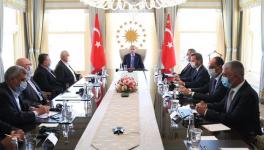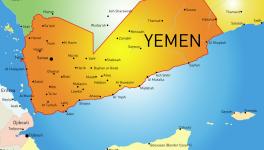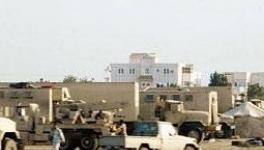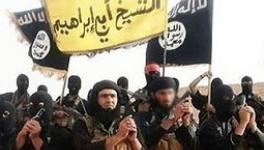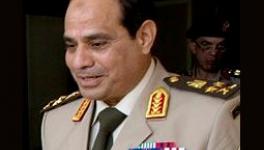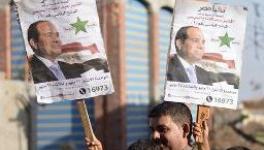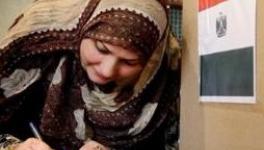Egypt on the Boil Again
The demand for 'military out' and immediate civilian rule can no longer be ignored. The price of this week long struggle – in Cairo, Alexandria, Mansoura, Suez and a number of other towns – has been 41 killed and more than 3000 injured. Five people have lost their eyes to rubber bullets. Anger has mounted with videos circulating showing a police officer dubbed the ‘eye hunter’, celebrating after taking out a protester’s eye. Ahmed Harrara, a young dentist lost his second eye in these protests after losing his first last January. Undeterred, he was back again in Tahrir square during last Friday’s massive protests.
What caused the first of the massive protests – on Friday, 18 November? It was a proposal by deputy Prime Minister, Ali El-Selmi that any new constitution to be written after the elections would enscone the Military above any civilian government that lead to the new round of protests. This is what brought all sections of political opinion except the Mubarakists onto the streets with just one demand – hand over power to a civilian government.
The first time after Mubarak’s fall, the Muslim Brotherhood, Salafists, the left and youth revolutionary forces, all came together in this ‘Friday of One Demand’. After a massive display of strength, most went back. A few stayed the night in a replay of the original protests and capturing of Tahrir square. On Saturday, the much reviled Central Security Forces, moved in to try and remove the protesters violently. This was what brought out people by the thousands, including youth and the unions in a repeat of the January battles. Also in a repeat of last January, Field Marshall Tantawi came on television a la Mubarak, made a speech with no apologies for the blood-letting and no offer to step down. The only concession he announced was the resignation of Prime Minister Essam Sharaf, who was increasingly seen to be a figurehead for the Supreme Council of Armed Forces (SCAF). The call for a massive protest on Tuesday, 22 November and again on Friday, 25 November and a turn-out of hundreds of thousands caused SCAF to beat a retreat. It has now apologised for the violence and promised it will accelerate the handing over of power to the civilians, though what this means remains nebulous.
The Muslim Brotherhood, long held to be a partner to the Armed Forces post-Mubarak, initially participated in the first protest. Soon after, it withdrew from the protests and started negotiating with SCAF. However, its Youth wing, which is also a part of the Revolutionary Youth Council has continued to participate. The Salafists, another powerful Islamist group which has emerged in Egypt after Mubarak backed with Saudi resources, are continuing with the protesters.
As of now, no major independent figure such as El Baradei is willing to head a new government unless promised a free hand. SCAF is unwilling to accede to this and therefore the selection of a new Prime Minster – Kamal Ganzouri, a former PM under Mubarak – who would presumably be more pliant. The protesters promised to block his entry to PM’s office and one youth was killed in this process.
The fate of the first round of elections in the week starting 28 November is now unclear. SCAF is still insisting that the elections will not be postponed but any elections that are held under current conditions will lose much of its legitimacy. Only the Muslim Brotherhood, the ones most likely to gain out of this phase of elections, is still sound gung-ho. In any case, the process of electing a new Parliament, whose sole task is to be drafting a new constitution has been made so complex that even seasoned analysts, let alone the people are finding it difficult to understand. There are individual candidates, party lists and multiple rounds of voting. And after all this, the Selmi proposal is that this Parliament nominate only 20% members in the drafting committee of the new constitution, with the rest coming from SCAF nominations.
Clearly, the Armed Forces, which had enormous goodwill amongst the people in the upsurge that threw out Mubarak, has lost most of it in the intervening period. While lingering closed door court proceedings are going on against Mubarak and his associates, expedited trials of more than 12,000 protesters have already taken place in military courts. Neither has the promises of civilian rule been honoured. What is on offer is a carefully controlled and protracted process, which might see a semblance of a civilian government by 2013, with major powers till retained by the Armed Forces. SCAF is continuing essentially a Mubarak regime without Mubarak.
Post Mubarak, the SCAF had forged links with Muslim Brotherhood. This is also the US line in Middle East – support a variant of the Turkish Justice and Development Party (AKP) that may have some differences over Israel but buys into the larger neoliberal agenda and historically a bitter foe of Arab nationalism. In the US scheme of things, the military is to be shored up as an independent player and a guarantor of the current strategic balance. This is the realignment that the US is now willing to accept once its favourite dictators are gone – a Ben Ali or a Mubarak.
Muslim Brotherhood as the best organised political force in Egypt is quite willing to play ball with the SCAF and the US. It was the ham-handed Selmi proposals that forced them onto the streets but they withdrew as quickly, once it became clear that the people were not looking for a refurbished old regime with a civilian Muslim Brotherhood façade.
The alliance of the Armed Forces and the Islamists were also visible in the brutal attacks on Coptic protests after some a church was burnt. It saw 26 Copts killed and more 300 injured in Maspero last October, in front of the Egyptian National TV station. This time, Tahrir and other protests saw the contrast – unlike Maspero, a unity of all forces and communities against the security forces.
The Muslim Brotherhood and old Mubarkists have an advantage in the current elections. This is because the setting up of new political parties has been made complex and difficult. It requires having 5,000 members in 10 governates (provinces), 'publishing' in two major dailies — meaning paying as advertisements costing at least a million Egyptian pounds -- of all the names of its members and so on. It is a process that favours those that are already established or have rich backers, and not the ones that have sprung post-Mubarak or had to function underground earlier. Not surprisingly, the protests on the streets are focussing on the basic demands – right to form unions, jobs, minimum wages, etc. New struggles and independent unions have sprung up all over Egypt that is changing the dynamics of the future.
The ongoing struggle has ensured that the course of counter revolution set by the Armed Forces, the Islamists and the Egyptian Ancienne Régime has been temporarily halted. The 6th April Movement and the Revolutionary Youth Council are once again setting the agenda through public protests. The fledgling left and secular forces may have a weak organisational base, but they have succeeded on changing the discourse. The Muslim Brotherhood gave a call for an alternate march last Friday, on the emotive issue of Israel attempting to change the architecture of the Al Aqsa Mosque in Jerusalem. It flopped -- people rallied to Tahrir Square instead.
Sally Moore, a young feminist, a Coptic Christian and one of the members of the Revolutionary Youth Council talked about the January Revolution of being a giant body without a head. Unless this body can grow a head very quickly, it will find navigating the course of everyday politics too difficult. For the Egyptian Revolution, January was just a start; a huge victory in getting Mubarak out, but nevertheless only a first step. It is now that they have to face the challenge of what kind of future do they want for Egypt. And this means parting of the ways between different social forces that united temporarily in the anti Mubarak struggle. The Egyptian people have broken the shackles of fear. Can they now break the shackles of the old regime? This is the real challenge.
Get the latest reports & analysis with people's perspective on Protests, movements & deep analytical videos, discussions of the current affairs in your Telegram app. Subscribe to NewsClick's Telegram channel & get Real-Time updates on stories, as they get published on our website.









